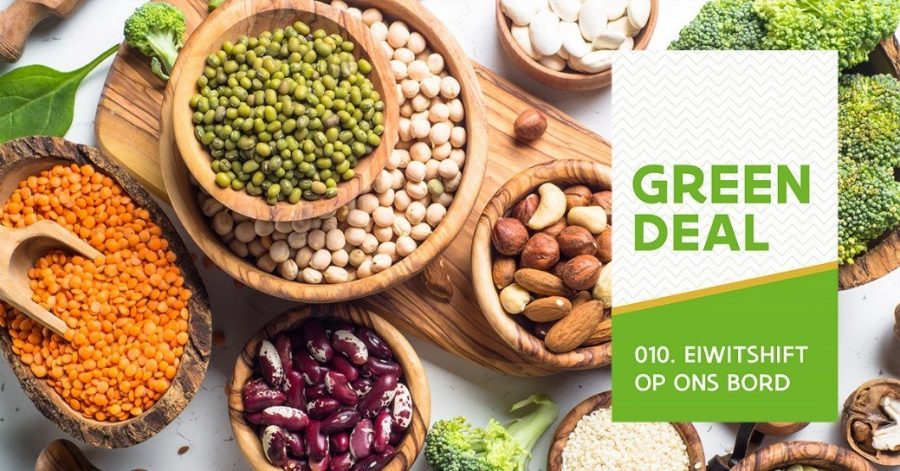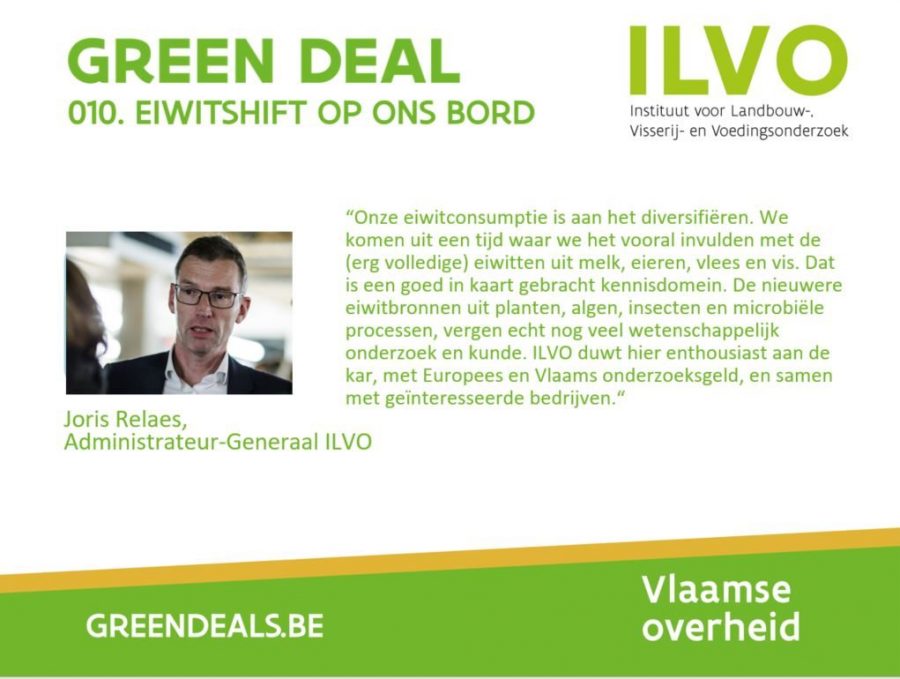Press release Green Deal Protein Shift aims for sustainable dietary patterns
On April 26, 2021, the Flemish Department of Environment, together with Flemish Minister of Environment Zuhal Demir and 64 partners, will launch the 'Green Deal Eprotein Shift on our Plate'. ILVO is one of those partners. The goal of this Green Deal is to improve the ratio between animal and vegetable protein-rich products in our diet. The protein shift aims to achieve an environmentally responsible and healthy dietary pattern. A protein shift also involves economic opportunities.

Sustainable food systems are receiving a great deal of attention, in Flanders and internationally. In 2020, the European Commission published the Farm to Fork Strategy and the Flemish government has also set the goal of developing a strong Flemish food policy. The development of a protein strategy from field to plate contributes to this. The 'Green Deal Protein Shift on our Plate" is in line with the European and Flemish ambitions on food policy and contributes as a concrete action to the Flemish protein strategy.
Proteins in our food
Proteins are indispensable as building material for the body in growth, for the production of blood cells, enzymes and hormones and for the maintenance and repair of body tissues. Foods rich in protein can be of animal (meat, fish, seafood, insects, milk and milk products, eggs), microbial (fungi, bacteria and microalgae) or plant origin (grains, legumes, nuts, seeds). One of the major challenges for our diet is to improve the ratio between animal and plant or alternative protein sources. Today, this ratio is suboptimal both in terms of the environment and our health.
Protein shift on our plate
Food in Flanders is of high quality and the Flemish population in general eats a rather diverse diet, but at the same time our diet places a heavy burden on the environment and on our own health due to an excessively high proportion of animal products and so-called empty calories (products with a high energy content and low nutritional value). In addition, the average Flemish person eats not only too many calories but also too few portions of vegetables, fruit, cereals and legumes.
In general, animal products have a larger environmental footprint than vegetable protein sources such as legumes, grains and some meat substitutes. Although the footprint of products and production methods varies widely, the diets with fewer animal products have enormous environmental benefits.
In a more plant-based and a less animal-based diet, we get a smaller percentage of protein from animal products and a larger percentage from plant products - and so we generally eat more plant products and less animal products. This evolution is called the protein shift. Today, the ratio is about 60/40 (animal/plant protein sources). The goal is to improve the ratio of animal and plant proteins in Flemish consumption, with a view to a ratio of 40/60 animal/plant proteins by 2030. The four-year Green Deal Protein Shift aims to contribute to that goal.
"This Green Deal brings together various objectives: we are working on a lower environmental impact and at the same time on better health. In doing so, we valorize economic opportunities by making full use of the innovation potential present in Flanders. This is well reflected by the initiators of this Green Deal", says Flemish Minister of Environment Zuhal Demir."
Changing dietary habits
In order to bring the objective of the protein shift to practice, insights about food habits and routines in Flanders are being brought together.
"We are working on understanding the food routines that are active in Flanders. On this basis, we can, together with all participants in the Green Deal, work in a more targeted way on a protein shift with a positive impact on various domains," clarifies Kristof Rubens of the Department of Environment, the initiator of this Green Deal.
The Green Deal provides a platform to bring together a diverse set of partners. Chain partners from the agricultural sector, the food processing industry, the retail and catering sector are represented. The Green Deal also unpacks partners who play a role in the broader food system: knowledge institutions, research groups, NGOs, professional organizations and (local) governments.
"Besides the consumers themselves, various actors in the broader food system play an important role in these routines. They shape and direct the routines through their communication and offerings. Therefore, in order to have an impact, we need different partners from the broad food system," Kristof Rubens emphasizes.
Starting the story around the protein shift
With over 50 participants, the Green Deal can count on a strong partnership. Each participant works from their own strengths to put the protein shift into practice. In addition to strengthening the position of the vegetable supply in the supermarket, in the catering industry or at events and the communication about this, the taste of the Flemish people is also stimulated through tasting sessions and informative workshops. Several partners are committed to innovate around local vegetable and alternative protein sources. Market and consumer behavioral research must form the right basis for a better deployment of future actions. For several actions, interesting partnerships are already emerging with, for example, the knowledge partners and individual companies or organizations. With these actions, not only consumers are reached, but also stakeholders in their own pre-chains such as suppliers and producers. In this way, the Green Deal has a catalyzing effect.
> More information about this Green Deal (starting points, commitments)
> An animated information film
Tenth Green Deal in Flanders
Green Deals are voluntary agreements between (private) partners and the Flemish government to jointly pursue sustainable initiatives, without compromising competitiveness and good business practice. The goal is to further green businesses and sectors.
The Green Deal Protein Shift on our Plate is the tenth Green Deal in Flanders. The Green Deal Shared Mobility was the first and was signed in the spring of 2017. It was followed by the Green Deal Circular Procurement, Brewers, Businesses and Biodiversity, Domestic Wood Heating, Sustainable Urban Logistics, Circular Building, Natural Gardens and Climate Friendly Cooling.
> More info on the Green Deals
Initiators
Department of Environment, Agency for Care & Health, Department of Agriculture & Fisheries, KU Leuven, Next Food Chain, The Shift, UGent and the Flemish Institute for Healthy Living
Participants
Atelier m. Foodlab, Abinda, Aldi Belgium, Alpro, Arteveldehogeschool, Arvesta, Barentz, Beanlife, Bio-Planet, Bond Beter Leefmilieu, BonRill, Buurtsuper. be, Buurtwinkels Okay, Colruyt Lowest Prices, Compass Group Belgium, Danone Belgium, De Hobbit, De Vegetarische Slager, Delhaize, EVA vzw, GoodPlanet Belgium, Greenway Foods, Greenyard, Het Facilitair Bedrijf, Hogeschool VIVES, IKEA Belgium, ILVO, Imperial Meat Products, Kriket, La Vie Est Belle, Lidl Belgium & Luxembourg, Nestlé Belgilux, Peas & Beans, POM West Flanders, PXL Agro- and Biotechnology, PXL-Catering, Rikolto, SmartWithFood, Sodexo, Solucious, City of Bruges, City of Ghent, City of Leuven, City of Ostend, Takeaway. com, Test Aankoop, The Chalo Company, Toerisme Vlaanderen, TOR Royal, Velt vzw, Vlaamse Beroepsvereniging van Diëtisten, VLAM & NICE, VMM, VVSG, WWF-België, Zorg Leuven
